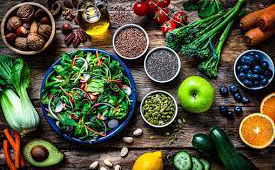In a world saturated with pills and prescriptions, it's empowering to discover that your body has an innate ability to heal itself. While certain medical interventions are necessary in some cases, there is an increasing interest in utilizing whole foods as a means to support the body's natural healing processes. In this article, we'll explore the powerful potential of whole foods in restoring and nourishing your body without relying on medication.
Nourishing Your Health: Unveiling the difference between Processed Foods and Whole Foods

As a 40-year-old mother of two, your health becomes even more vital in order to keep up with the demands of a busy schedule. Diet plays a substantial role in achieving and maintaining optimal health. Two key terms you may have come across are processed foods and whole foods. In this article, we'll explore the differences between these two types of foods and how they can impact your overall well-being.
1. What Are Processed Foods?
Processed foods are often altered from their natural state to increase their shelf life and enhance taste. These products typically undergo various techniques to add artificial flavors, colors, and preservatives.
Highly processed foods often include snacks, sugary drinks, fast food, and convenience meals. They may provide convenience, but at what expense?
2. Understanding Whole Foods
On the other hand, whole foods are in their natural state, unprocessed or minimally processed. Whole foods include fruits, vegetables, whole grains, lean proteins, and nuts. They retain their natural nutrients, fiber, and health-promoting benefits. Incorporating more whole foods into your diet can provide a range of long-term health benefits. If you look at your plate of food in front of you can you recognise their natural form and color? This will be a good indication that you are on the right path with selecting what you choose to eat.
The Impact of Processed Foods on Your Health
Processed foods have become a prominent part of the modern diet, largely due to their convenience and widespread availability. However, their impact on your health can be detrimental.
A. Nutritional Deficiency: Processing often involves stripping foods of essential nutrients and fiber, leaving behind empty calories. This can lead to nutrient deficiencies, leaving you feeling tired and lacking in vitality.
B. Increased Health Risks: Regular consumption of processed foods has been linked to various health risks, including obesity, heart disease, type 2 diabetes, and inflammation. These conditions are of particular concern as you approach your 40s, and prioritizing your health becomes even more important.
C. Hidden Ingredients: Processed foods may contain additives, such as trans fats, high fructose corn syrup, and excessive sodium, which can negatively impact your health when consumed regularly.
The Role of Whole Foods in Your Health
Whole foods, on the other hand, offer a plethora of health benefits that can support your well-being and vitality at this stage of life.
A. Essential Nutrients: Whole foods are packed with essential vitamins, minerals, antioxidants, and dietary fiber. These nutrients are essential for maintaining a healthy immune system, promoting proper digestion, and providing sustained energy throughout the day.
B. Optimal Weight Management: Whole foods are often lower in calories and higher in nutrients compared to processed foods. Incorporating more whole foods into your diet can support healthy weight management and help you achieve your fitness goals.
C. Long-term Health: Whole foods, particularly fruits and vegetables, are rich in antioxidants that help combat oxidative stress and reduce the risk of chronic diseases, such as heart disease, certain cancers, and cognitive decline.
Practical Tips for Transitions
Transitioning from a diet heavy in processed foods to one centered around whole foods can be challenging. Here are some practical tips to help make the shift easier:
Start Slowly: Gradually introduce more whole foods into your diet while minimizing processed foods. Small changes over time can lead to significant improvements in your overall health. Even something as simple as changing the oils in your home that you cook with to Olive Oil or Avocado Oils with already be a shift in the right direction.
Meal Planning: Plan your meals in advance and include a variety of whole foods to ensure you get a wide range of nutrients. By reducing the time frame of eating per day to around 8 hours per day and fasting with water the other 14 hours will make such a big difference in your gut health alone.
Experiment with Recipes: Explore new recipes that incorporate whole foods. This can make your journey towards healthier eating exciting and enjoyable. When sitting down to a meal try and eat your vegetables first before moving on to the other items on your plate.
As a 40-year-old mother of two, your health is of utmost importance. Understanding the differences between processed foods and whole foods is the first step toward making informed dietary choices for yourself and your children. By prioritizing whole foods in your diet, you can reap the benefits of improved nutrition, better weight management, and reduced risk of chronic diseases. Embrace the power of whole foods and nourish your health for a vibrant and fulfilling life ahead.
If you like the content of this blog, I recommend listening to the following podcast from leading doctors:
Dr Pradip Jamnadas (https://youtu.be/Yg6UhhV_K1s)
Dr William Li (https://youtu.be/cNPV_5stNLo)
Dr Daniel Amen (https://youtu.be/90bxNpimtb8)
Further Reading
In recent years, there has been a growing interest in sustainable tourism, and guesthouses powered by alternative energy sources have emerged as a promising solution to the environmental challenges faced by the tourism industry. These guesthouses use renewable energy sources such as solar, wind, hydro, or geothermal to generate electricity, heat water, and provide other essential services to guests. In this blog article, we will explore the benefits of guesthouses powered by...
Cape Town, South Africa, is a city with a high potential for sustainable tourism due to its abundant natural resources, such as sunshine and wind. Guesthouses powered by alternative energy sources are a great way for the city to showcase its commitment to sustainable tourism while providing visitors with unique and eco-friendly accommodations. In this article, we will explore some of the guesthouses in Cape Town that are powered by alternative energy...





Share This Post